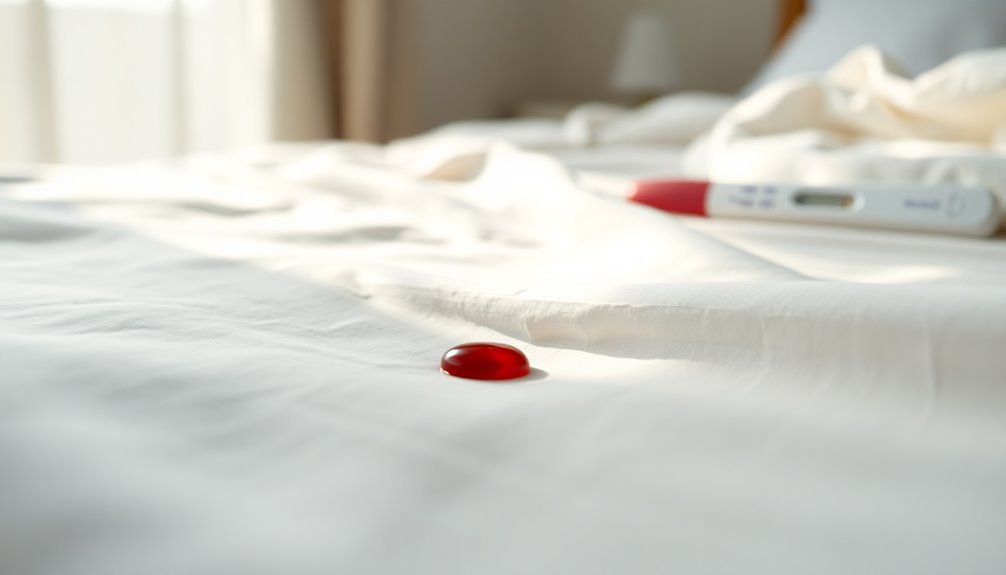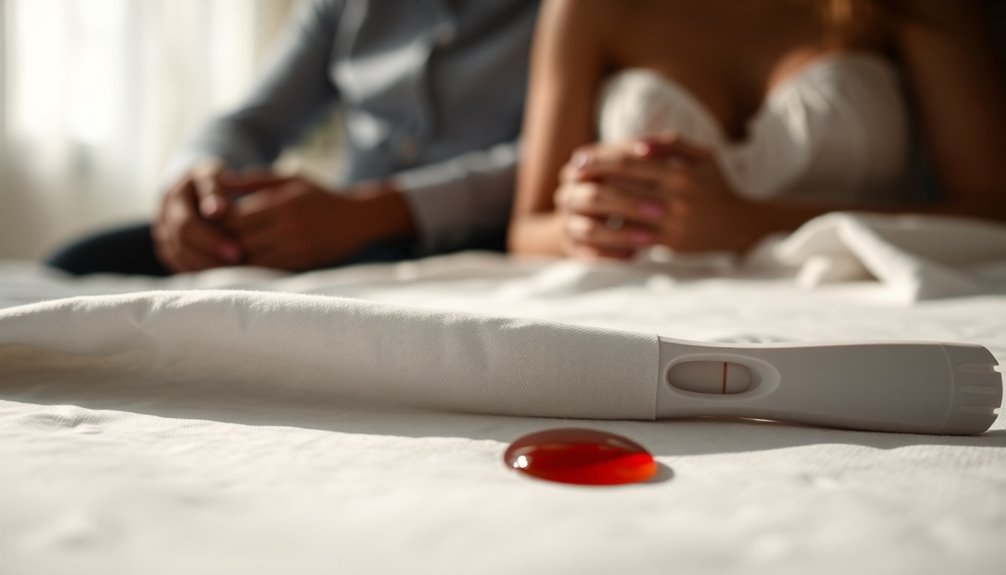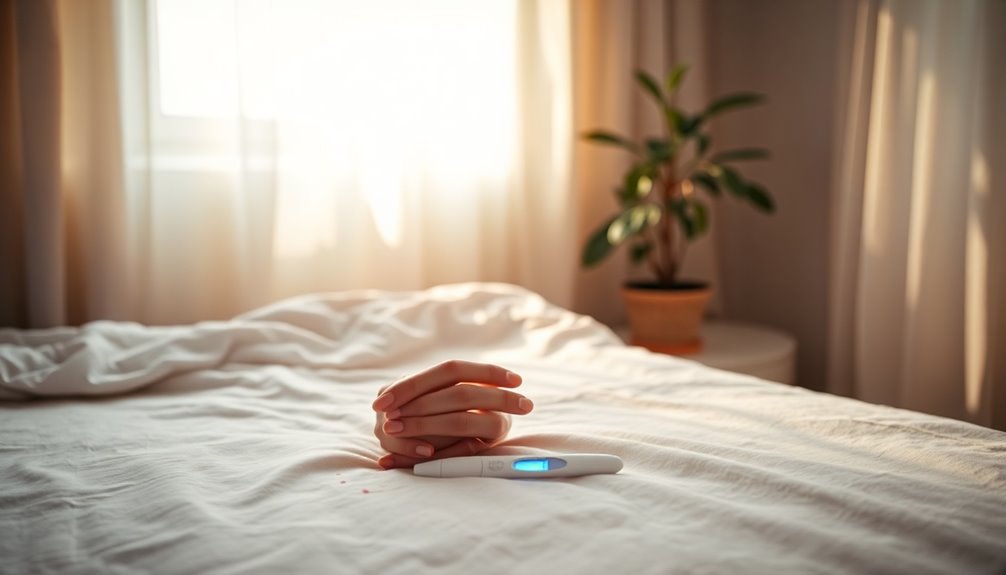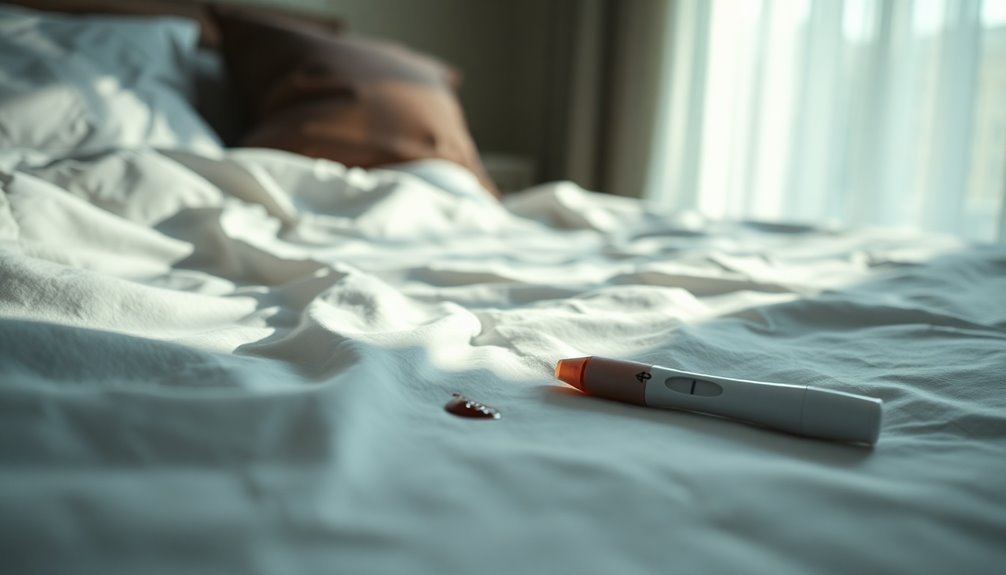Bleeding after sex isn't necessarily a sign of pregnancy; various factors could be at play. It may be due to cervical irritation, vaginal dryness, or infections like STIs. Some women do experience light spotting from implantation bleeding, typically occurring 6-12 days after conception. However, this is just one potential cause. If you see heavy bleeding or persistent spotting, it's vital to consult a healthcare provider, as this could indicate more serious issues. Understanding the differences between bleeding types will help clarify your situation further and provide essential insights into what might be happening.
Key Takeaways
- Bleeding after sex is often not a sign of pregnancy and can result from various causes like cervical irritation or infections.
- Light bleeding 6-12 days after fertilization may indicate implantation bleeding, which is different from postcoital bleeding.
- Implantation bleeding typically appears as pink or brown spots, while postcoital bleeding can be heavier and may require medical evaluation.
- Increased blood flow to the cervix during pregnancy can cause light bleeding, but heavy bleeding may indicate a miscarriage.
- Persistent or heavy bleeding after sex should prompt consultation with a healthcare provider for proper evaluation.
Understanding Bleeding After Sex

When you experience bleeding after sex, it can be concerning, but it often has various causes unrelated to pregnancy. For instance, cervical irritation can occur due to friction or infections, leading to bleeding.
You might also encounter light spotting, which can be mistaken for implantation bleeding. However, implantation bleeding typically happens 6-12 days after conception and is usually light and short-lived.
It's important to differentiate between light spotting and heavier bleeding, as the latter may indicate a serious condition. Hormonal changes can also contribute to this issue.
If you notice persistent bleeding after sex, it's wise to consult your healthcare provider to rule out any serious problems and guarantee your reproductive health is in check.
Common Causes of Bleeding

Bleeding after sex can stem from several common causes that aren't necessarily linked to pregnancy. One possible reason is cervical polyps, which are benign growths that can cause postcoital bleeding.
Vaginal dryness, often due to hormonal changes during menstruation or menopause, can also lead to discomfort and bleeding during intercourse. While some people may confuse light spotting known as implantation bleeding with postcoital bleeding, they occur at different times and for different reasons.
Additionally, sexually transmitted infections (STIs) like chlamydia or gonorrhea can cause cervicitis, leading to inflammation and potential bleeding after sex.
If you experience consistent bleeding after sex, it's important to consult a healthcare provider for proper evaluation and diagnosis.
Bleeding and Pregnancy Connection

While many people may worry about the implications of bleeding after sex, it's important to understand that it can sometimes be linked to pregnancy.
If you experience light bleeding around 6-12 days after fertilization, it could be implantation bleeding. This type of bleeding is usually brief and may appear as pink or brown spots, setting it apart from regular menstrual bleeding. Approximately 20-30% of pregnant individuals notice this phenomenon, often confusing it with their expected period.
Additionally, increased blood flow to the cervix during pregnancy might cause light bleeding after intercourse.
However, you should always consult a healthcare provider if you experience bleeding during pregnancy to rule out complications like miscarriage or ectopic pregnancy.
Implantation Bleeding Explained

If you're experiencing light spotting about a week or so before your expected period, it might be implantation bleeding.
This occurs when a fertilized egg attaches to your uterine lining, often accompanied by mild cramping.
Understanding its symptoms and how to differentiate it from regular bleeding can help you determine if pregnancy is a possibility.
Timing of Implantation Bleeding
Understanding the timing of implantation bleeding is essential for anyone trying to discern early signs of pregnancy. This type of bleeding typically occurs between 6 to 12 days after conception, when the fertilized egg attaches to the uterine lining. It's often mistaken for a menstrual period due to its timing.
| Implantation Bleeding | Menstrual Period |
|---|---|
| Light bleeding, pink or brown | Bright red, heavier flow |
| Lasts a few hours to days | Lasts 3-7 days |
| Common early pregnancy symptom | Not a sign of pregnancy |
| 20-30% experience it | Nearly all individuals experience it |
Recognizing these differences can help you identify whether what you're experiencing is a sign of pregnancy or just your menstrual cycle.
Symptoms and Characteristics
What exactly should you look for to identify implantation bleeding? Recognizing the signs can help you determine if it's a sign of early pregnancy. Here are a few key characteristics:
- Timing: Occurs 6 to 12 days post-conception.
- Color: Typically pink or brown, not bright red.
- Flow: Light bleeding that lasts from a few hours to a couple of days.
If you notice spotting after sex around your expected period, it could be implantation bleeding. It's usually much lighter than a menstrual period and may come with mild cramping.
However, if you experience heavy bleeding during sex or intense pain, consider consulting a healthcare provider to rule out other causes of vaginal bleeding.
Differentiating From Other Bleeding
Spotting after sex can raise concerns, especially when trying to discern if it's related to early pregnancy or something else.
Implantation bleeding typically occurs 6 to 12 days post-fertilization and is characterized by light spotting that may appear pink or brown. This type of bleeding is usually much lighter and shorter than menstrual bleeding, lasting just a few hours to a couple of days.
Mild cramping might accompany it, but severe pain could indicate an underlying cause, like sexually transmitted infections or cervical ectropion.
When to Seek Medical Advice

If you experience bleeding after sex, it's crucial to pay attention to your body's signals and seek medical advice when necessary.
Consider consulting a healthcare provider if you notice:
- Persistent or heavy bleeding, especially in early pregnancy
- Severe abdominal pain, which could indicate a miscarriage or ectopic pregnancy
- Symptoms like fever, lightheadedness, or unusual discharge, suggesting an underlying infection
Don't ignore these signs; they could signal serious health issues.
Monitoring the timing of the bleeding in relation to your menstrual cycle can also help clarify whether it's normal spotting or something more concerning.
Trust your instincts and prioritize your health by reaching out to a healthcare professional whenever you're uncertain.
Risk Factors for Bleeding

Understanding the risk factors for bleeding after sex is essential, especially during pregnancy.
Cervical changes can increase blood flow to the cervix, which might cause bleeding after sex. If you have a history of cervical infections, such as STIs, you're at a higher risk for postcoital bleeding, often mistaken for pregnancy-related bleeding.
Hormonal changes during pregnancy can also lead to vaginal dryness, potentially resulting in irritation and bleeding after intercourse. Additionally, using hormonal birth control may cause irregular bleeding patterns, complicating your ability to identify pregnancy-related bleeding.
Diagnosis of Bleeding After Sex

How can you determine the cause of bleeding after sex? Start by consulting a healthcare provider for an accurate diagnosis.
They'll likely review your medical history and assess the bleeding patterns you've experienced. Key steps in the diagnosis process may include:
- A pelvic exam to check for lesions or inflammation
- Pregnancy tests and STI screenings to rule out infections
- A colposcopy if bleeding persists, allowing for a closer look at the cervix
Diagnostic tests are essential to identify any abnormal cervical changes or underlying issues.
If necessary, a transvaginal ultrasound might be utilized for a deeper evaluation of your pelvic organs. Understanding the cause is vital for effective treatment and peace of mind.
Prevention Strategies

To prevent bleeding after sex, it's important to take proactive steps that promote comfort and health.
Using water-based lubricants can reduce friction, minimizing irritation and the risk of postcoital bleeding. Engaging in sufficient foreplay enhances natural lubrication, helping to avoid dryness.
Regular gynecological check-ups are essential for identifying underlying issues, like cervical polyps or infections, that can lead to bleeding. Practicing safe sex, including the use of condoms, lowers the risk of sexually transmitted infections that may cause cervical inflammation.
Additionally, being aware of your menstrual cycle and timing sexual activity accordingly can help reduce the chances of bleeding related to hormonal fluctuations or ovulation.
Taking these steps can lead to a more pleasurable and safer experience.
Managing Bleeding After Sex

If you're experiencing bleeding after sex, it's important to identify the possible causes, like vaginal dryness or infections.
Keep an eye on the situation, and if the bleeding persists or you notice other concerning symptoms, don't hesitate to seek medical help.
Early intervention can lead to effective management and peace of mind.
Causes of Postcoital Bleeding
Experiencing postcoital bleeding can be concerning, especially when it stems from various underlying causes. Understanding these causes can help you address the issue effectively.
- Cervical polyps: Benign growths that may bleed during intercourse.
- Vaginal dryness: Often due to hormonal changes, leading to friction and bleeding.
- Sexually transmitted infections (STIs): Conditions like chlamydia or gonorrhea can cause cervicitis, resulting in inflammation and bleeding.
If you notice persistent or heavy postcoital bleeding, it's important to seek a medical evaluation.
When to Seek Help
Recognizing when to seek help for postcoital bleeding is important for your health and peace of mind. If you experience heavy bleeding after sex or it's accompanied by abdominal pain, you should consult a healthcare provider immediately. This could indicate serious conditions like cervical infections or complications during pregnancy, such as miscarriage.
Monitor the frequency and severity of your bleeding; occasional light spotting mightn't be concerning, but persistent issues warrant medical attention. Additionally, if you have a history of STIs or notice changes in your menstrual cycle alongside bleeding, it's crucial to get evaluated.
Symptoms like fever, pelvic pain, or unusual discharge also require prompt medical evaluation to identify any underlying issues.
Frequently Asked Questions
Does Bleeding After Sex Mean Early Pregnancy?
Bleeding after sex doesn't automatically mean you're experiencing early pregnancy. It can stem from various factors like cervical changes, infections, or even dryness.
While some might confuse it with implantation bleeding, that's usually lighter and shorter.
If you notice persistent bleeding or severe pain, it's essential to consult a healthcare provider. They can help identify the cause and make certain everything's alright with your reproductive health.
Always listen to your body and seek help when needed.
What Does It Mean if You Bleed After Sex?
Have you ever wondered why you might bleed after sex?
Bleeding can happen for several reasons, like cervical irritation or infections. It's not uncommon, as up to 9% of individuals with periods experience it.
However, if the bleeding is persistent or heavy, it's important to see a doctor.
Monitoring the characteristics and timing of the bleeding helps you understand whether it's something minor or if it needs further evaluation.
Can a Woman Who Bleed After Sex Get Pregnant?
Yes, a woman who bleeds after sex can still get pregnant.
Bleeding can happen for various reasons, like hormonal changes or cervical irritation, and these don't necessarily affect fertility.
If you experience bleeding, it's important to pay attention to any other symptoms and consult a healthcare provider if the bleeding persists or is heavy.
Understanding the cause of your bleeding can help you manage your health effectively while considering pregnancy.
What Are 5 Warning Signs of a Possible Problem During Pregnancy?
You might feel a sense of unease if you notice something's off during your pregnancy.
Watch for these five warning signs: heavy or persistent bleeding, severe abdominal pain, bright red blood with clots, fever or chills, and sudden changes in your bleeding patterns.
Each of these could hint at serious complications requiring immediate medical attention.
Don't ignore these signals; your health and your baby's well-being depend on prompt action and communication with your healthcare provider.
Conclusion
In the delicate dance of intimacy, bleeding after sex can feel like an unexpected storm cloud. While it might spark thoughts of pregnancy, it's essential to remember that various factors could be at play. If the rain continues or you're concerned, don't hesitate to seek medical advice. Your health is the vibrant garden that needs tending. Stay informed, and you'll navigate this journey with confidence, turning potential worries into a path of understanding and care.










